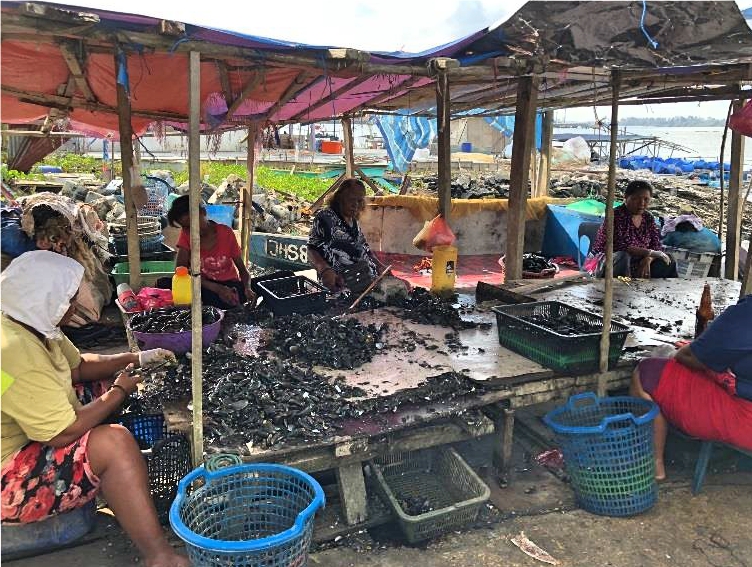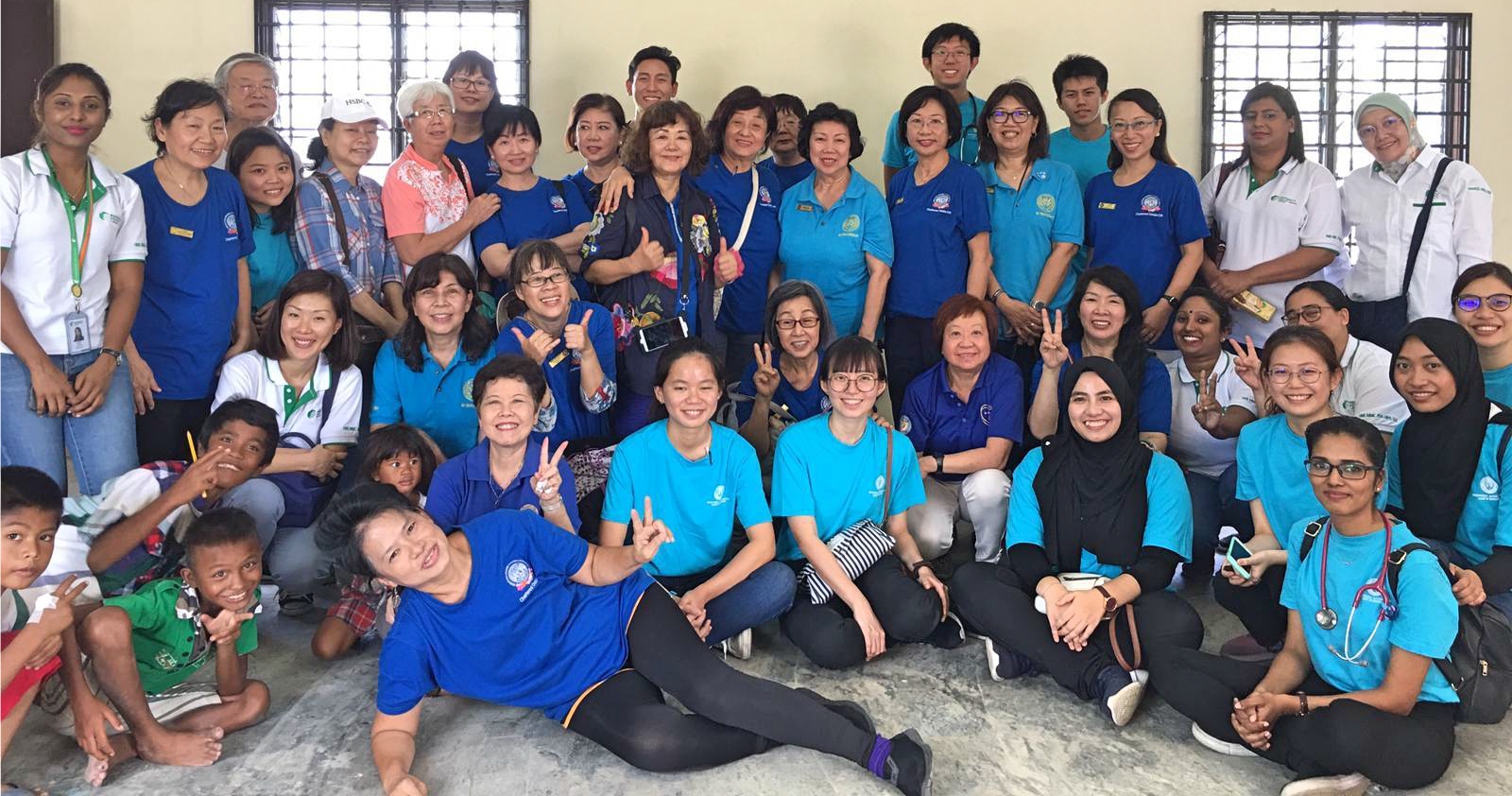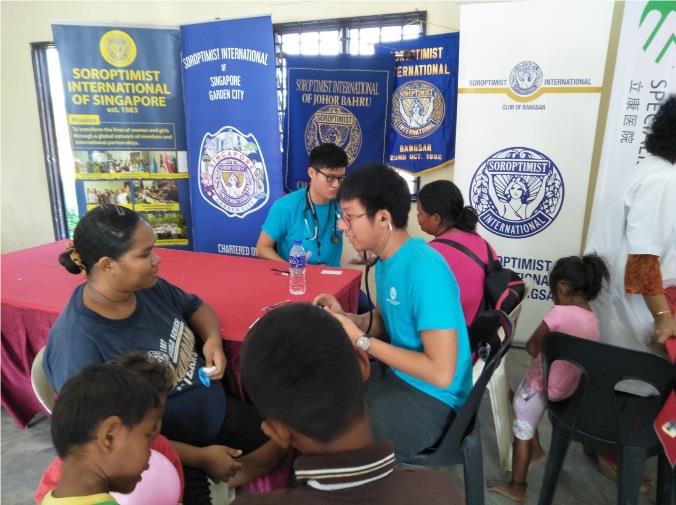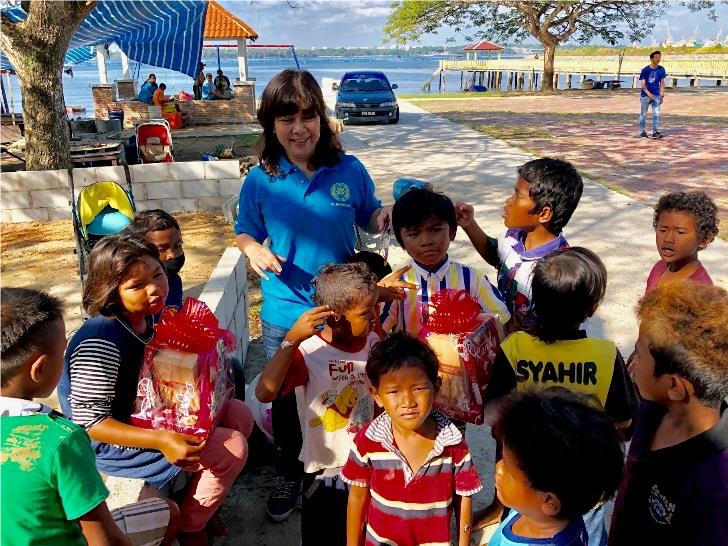Keep Healthy and Happy Carnival at Orang Asli Settlement Kampung Kuala Masai, Johor
Blog by Nora Lam from SI Bangsar
Saturday 23rd February 2019
The run up to the Carnival involved Nora Lam SI Club of Bangsar (SICB) Project coordinator setting out to recce and enquire about the possibility of educating the villagers and particularly the children about health, cleanliness and the importance of education.
The sight of many unhealthy people inactive without purpose, resideing in the homes that had been built by the Government, and a few of them cleaning mussels for a living at Ringgit Malaysia 7-8 ( Aus$3) a bucket meant they all earned a meagre income. Economic development is an important factor for these women.
 The sight of many unhealthy people inactive without purpose, resideing in the homes that had been built by the Government, and a few of them cleaning mussels for a living at Ringgit Malaysia 7-8 ( Aus$3) a bucket meant they all earned a meagre income. Economic development is an important factor for these women. Thoughts of converting the mussel shells (dumped at the beach) into fertilizer (as they are rich in calcium) crossed her mind and some connections to farmers of organic vegetables would be ideal.
The sight of many unhealthy people inactive without purpose, resideing in the homes that had been built by the Government, and a few of them cleaning mussels for a living at Ringgit Malaysia 7-8 ( Aus$3) a bucket meant they all earned a meagre income. Economic development is an important factor for these women. Thoughts of converting the mussel shells (dumped at the beach) into fertilizer (as they are rich in calcium) crossed her mind and some connections to farmers of organic vegetables would be ideal.
Highlighting this plight to the Singapore National Rep Joyce Lim, led to 12 Soroptimists from 3 Singapore Clubs crossing over to Johor Bahru on 22nd February 2019. SICB's members Suat Pheng, Agnes, Helena, Doris and Nora and Nora's sister Phyllis a friend of Soroptimist, had a great time bonding , eating lunch , dinner even supper and planning the finer details of the carnival on 23rd February with our Soroptimist Singapore sisters.
We knew that a project aimed at educating the Orang Asli (natives) who are seafarers would be challenging and the Carnival to kickstart it started off with a sense of excitement from us and apathy from the locals. However, once we began setting up the health screening and games areas, curiousity got the better of the villagers. Some of us went from house to house calling them out to join us. The area was badly littered and our investigations revealed that just 2 weeks before our event, some helpers had already cleaned it. However, the Orang Asli did not have extensive knowlege about hygiene and have not cultivated habits about keeping clean. We saw a huge dump of clothers and garbage near the jetty.
 This was a 5 club project spearheaded by SI Club of Bangsar. The collaboration went well with support from SI Clubs of Singapore, Garden City, SI Orchid as well as SI Johor Bahru. Regency Hospital collaborated by providing nurses to handle the health screening, hand hygiene whilst SIJB had Dr. Maria Fernadez as consultant and Dr. Kirthi advising on dental hygiene. The Newcastle University final year medical students highlighted steps to be taken in the event of stroke, choking, diabetic reactions and other sudden emergencies. A guide on good nutrition and hygiene was also helpful as the children were curious to learn more. The children also explained that they did not wear any footwear as it was too hot, and they would always bathe in the river as the salty water would heal their wounds.
This was a 5 club project spearheaded by SI Club of Bangsar. The collaboration went well with support from SI Clubs of Singapore, Garden City, SI Orchid as well as SI Johor Bahru. Regency Hospital collaborated by providing nurses to handle the health screening, hand hygiene whilst SIJB had Dr. Maria Fernadez as consultant and Dr. Kirthi advising on dental hygiene. The Newcastle University final year medical students highlighted steps to be taken in the event of stroke, choking, diabetic reactions and other sudden emergencies. A guide on good nutrition and hygiene was also helpful as the children were curious to learn more. The children also explained that they did not wear any footwear as it was too hot, and they would always bathe in the river as the salty water would heal their wounds. A medical check up was set up for the orang asli at the Dewan (Hall ) of the Village and a site for the children to play and learn was set up at the terrace area of one of the residents.
A medical check up was set up for the orang asli at the Dewan (Hall ) of the Village and a site for the children to play and learn was set up at the terrace area of one of the residents.
The Singapore members organized games for the children and the Bangsar members assisted at the health section and also demonstrated crochet work to encourage the women to take up a hobby that could be commercialized. Our observation was that education was the priority as the women had little exposure toeducation.
About 10 women and 27 (about 15 girls) children participated. The community was not far from Johor Bahru city, however, the fact the men are mainly fishermen made it difficult for them to participate in the medical screening.
The feedback received was that some children were malnourished and the women had a lot of health issues such as obesity, bad diets, lack of family planning.
The Singapore team and members of SICB will move to Stage 2 which is a Literacy Programme for the children teaching them in monthly workshops over firstly a one year period ' practical basic Mandarin and the English language (they already have a smattering of Malay as some go to the national school) followed by general knowledge and good values. This would enable them to communicate with other races in the community and eventually assist them in obtaining jobs in various sectors and reduce their reliance on fishing. Fish in the area are also facing depletion. A sustainable project would require at least 3-5 years commitment. The womenfolk could be taught family planning and nutrition which would come with added economic empowerment. Mussel shells, recycled into fertilizers which can be sold to farmers is another target….we'll be back !
Follow our Project and Educate to Lead.
Report by Nora Lam SI Bangsar Project Coordinator
 “I felt like the Pied Piper of Kua la Masai with all the kids . They are active in sports, and it would be good to develop this talent”.
“I felt like the Pied Piper of Kua la Masai with all the kids . They are active in sports, and it would be good to develop this talent”.